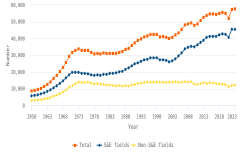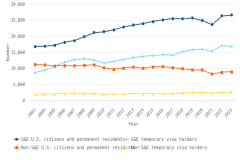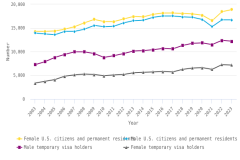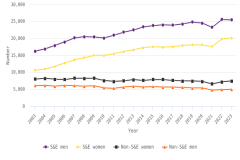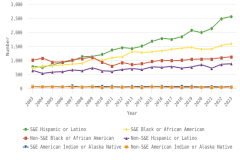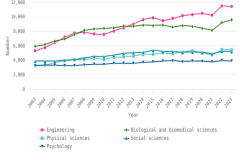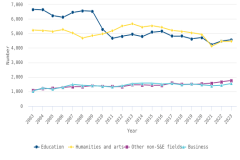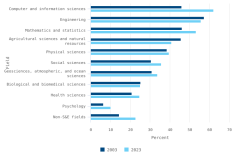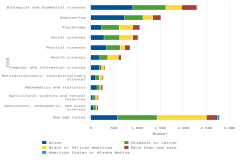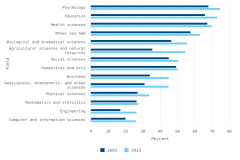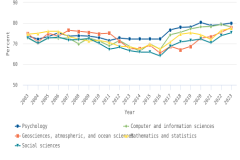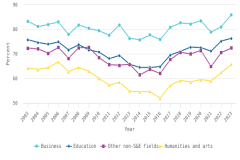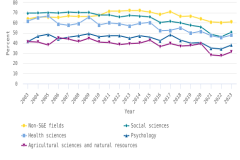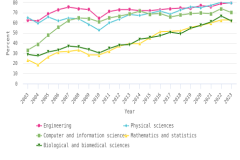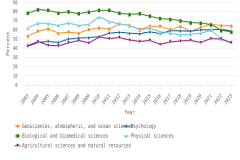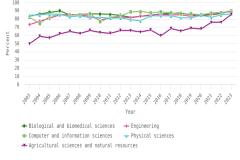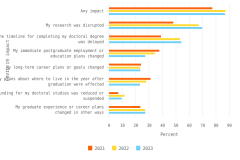Report
Data source
The Survey of Earned Doctorates (SED) is the sole data source for Doctorate Recipients from U.S. Universities: 2023. The principal elements of the 2023 SED data collection are described in the sections that follow. More detailed information, including the “Technical Notes” and related technical tables, are available at https://ncses.nsf.gov/surveys/earned-doctorates/2023.
This product has been reviewed for unauthorized disclosure of confidential information under NCSES-DRN24-017.
Survey eligibility. The SED collects information on research doctorate recipients only. Research doctorates require the completion of a dissertation or equivalent project, are oriented toward preparing students to make original intellectual contributions in a field of study and are not primarily intended for the practice of a profession. The 2023 SED recognized 18 distinct types of research doctorates. In 2023, 98.6% of research doctorate recipients earned a PhD.
The population eligible for the 2023 survey consisted of all individuals who received a research doctorate from an accredited U.S. academic institution in the 12-month period from 1 July 2022 to 30 June 2023.
Survey universe. The total universe consisted of 57,862 persons in 459 institutions that conferred research doctorates in academic year 2023.
Data collection. Institutional coordinators at each doctorate-awarding institution distributed the SED Web survey link to individuals receiving a research doctorate. The self-administered Web survey is the primary mode of SED completion. Nonrespondents were contacted by e-mail, mail, and text message to complete the Web survey. If the series of follow-up e-mails, mailings, and text messages was unsuccessful, the survey contractor attempted to reach nonrespondents to complete an abbreviated survey by computer-assisted telephone interviewing. RTI International served as the 2023 SED data collection contractor on behalf of NCSES.
Survey response rates. In 2023, 91.2% of research doctorate recipients completed the survey. Limited records (field of study, doctoral institution, and sex) are constructed for nonrespondents from administrative records of the university—commencement programs, graduation lists, and other public records—and are included in the reported total of doctorate recipients. The survey response rates for 1970–2023 and the item response rates for 2017–23 are provided in table A-2 and table A-3 of the survey’s 2023 “Technical Notes.”
Time series data changes.
EdD program reclassification. After a multiyear review of Doctor of Education (EdD) degree programs participating in the SED, 143 programs were reclassified from research doctorate to professional doctorate over the 2010–11 period. No additional reclassifications of EdD degree programs are planned. SED data are no longer being collected from graduates earning degrees from the reclassified EdD programs, and this has affected the reporting of the number of doctorates awarded by sex, citizenship, race, and ethnicity. Figure 7 in this report shows the impact of the decline in the number of doctoral degrees awarded in education from 2009 to 2011. Readers should note that the declines from 2009 to 2010 and from 2010 to 2011 are at least partly attributable to the EdD reclassification.
Field. Beginning in 2021, field of doctorate data are collected using a modified version of the 2020 Classification of Instructional Programs (CIP) codes and reported using a new SED-specific taxonomy (table A-4). Adjustments to the 2020 CIP for the SED data collection (SED-CIP) included, among other changes, the addition of over 50 fields of study codes collected in the SED but not covered in the 2020 CIP. The SED-CIP now collects over 1,650 fields for field of study reporting, compared to the 334 field codes collected in 2020 SED and prior years. The SED-CIP codes collected are then aggregated into 306 detailed fields nested under 68 major fields and 16 broad fields, which are used for reporting in the 2023 detailed data tables. This field structure is aligned with the NCSES Taxonomy of Disciplines (TOD) to facilitate comparison with other NCSES surveys as well as with the Integrated Postsecondary Education Data System (IPEDS) Completions survey. A crosswalk of the SED-CIP codes to the new SED broad, major, and detailed fields of study is shown in table A-5 of the 2023 “Technical Notes.” To facilitate the trend data comparison with prior years, table A-6 presents a crosswalk of the SED-CIP codes to the SED trend broad, major, and fine fields of study which can be used to construct the comparable 2021, 2022, and 2023 data.
Data license. Microdata from the Doctorate Records File (cumulative SED data file) may be obtained through a restricted-use data license. (See https://ncses.nsf.gov/licensing.)
 An official website of the United States government
An official website of the United States government


